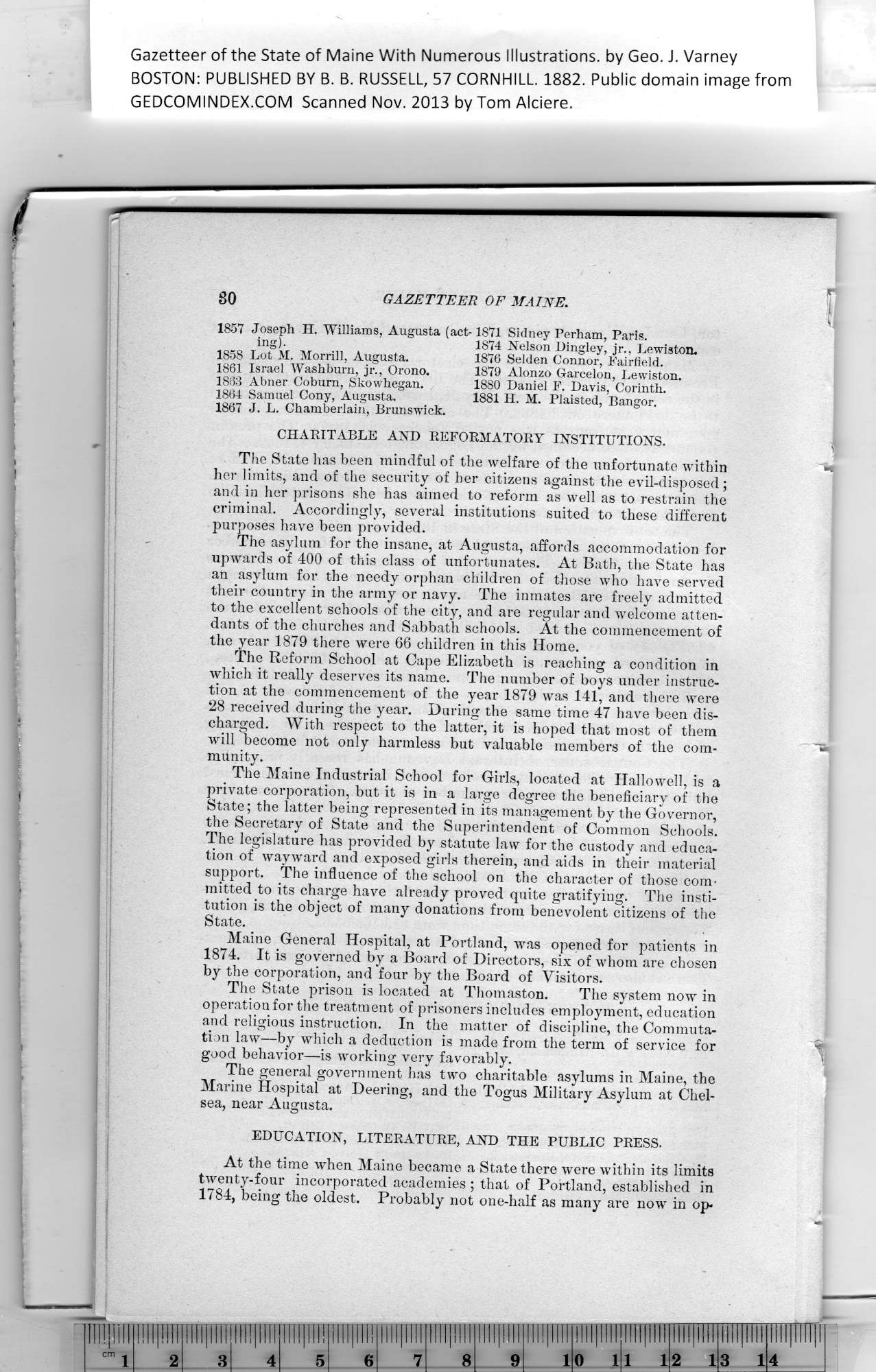|
Gazetteer of the State of Maine With Numerous Illustrations, by Geo. J. Varney
BOSTON: PUBLISHED BY B. B. RUSSELL, 57 CORNHILL. 1882. Public domain image from
80 GAZETTEER OF MAINE.
1857 Joseph H. Williams, Augusta (act-1871 Sidney Perham, Paris.
mg). 1874 Nelson Dingley, jr., Lewiston.
1858 Lot M. Morrill, Augusta. 1876 Selden Connor, Fairfield.
1861 Israel Washburn, jr., Orono. 1879 Alonzo Garcelon, Lewiston.
1863 Abner Coburn, Skowhegan. 1880 Daniel F. Davis, Corinth.
1864 Samuel Cony, Augusta. 1881 H. M. Plaisted, Bangor.
1867 J. L. Chamberlain, Brunswick.
CHARITABLE AND REFORMATORY INSTITUTIONS.
The State has been mindful of the welfare of the unfortunate within
her limits, and of the security of her citizens against the evil-disposed;
and in her prisons she has aimed to reform as well as to restrain the
criminal. Accordingly, several institutions suited to these different
purposes have been provided.
The asylum for the insane, at Augusta, affords accommodation for
upwards of 400 of this class of unfortunates. At Bath, the State has
an asylum for the needy orphan children of those who have served
their country in the army or navy. The inmates are freely admitted
to the excellent schools of the city, and are regular and welcome atten-
dants of the churches and Sabbath schools. At the commencement of
the year 1879 there were 66 children in this Home.
The Reform School at Cape Elizabeth is reaching a condition in
which it really deserves its name. The number of boys under instruc-
tion at the commencement of the year 1879 was 141, and there were
28 received during the year. During the same time 47 have been dis-
charged. With respect to the latter, it is hoped that most of them
will become not only harmless but valuable members of the com-
munity.
_ The Maine Industrial School for Girls, located at Hallo well, is a
private corporation, but it is in a large degree the beneficiary of the
State; the latter being represented in its management by the Governor,
the Secretary of State and the Superintendent of Common Schools.
The legislature has provided by statute law for the custody and educa-
tion of wayward and exposed girls therein, and aids in their material
support. The influence of the school on the character of those com-
mitted to its charge have already proved quite gratifying. The insti-
tution is the object of many donations from benevolent citizens of the
State.
Maine General Hospital, at Portland, was opened for patients in
1874. It is governed by a Board of Directors, six of whom are chosen
by the corporation, and four by the Board of Visitors.
The State prison is located at Thomaston. The system now in
operation for the treatment of prisoners includes employment, education
and religious instruction. In the matter of discipline, the Commuta-
tion law—by which a deduction is made from the term of service for
good behavior—is working very favorably.
The general government has two charitable asylums in Maine, the
Marine Hospital at Deering, and the Togus Military Asylum at Chel-
sea, near Augusta.
EDUCATION, LITERATURE, AND THE PUBLIC PRESS.
At the time when Maine became a State there were within its limits
twenty-four incorporated academies ; that of Portland, established in
1784, being the oldest. Probably not one-half as many are now in op.
PREVIOUS PAGE ... NEXT PAGE
This page was written in HTML using a program written in Python 3.2
| 